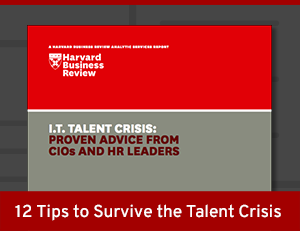If you're an IT leader, you're already painfully familiar with the shortage of available IT talent — a national issue that is especially dangerous in tech-heavy Silicon Valley. One solution is to hire employees for technology jobs even if they don't have STEM (science, technology, engineering or math) degrees, according to PK Agarwal, Regional Dean, and CEO of Northeastern University-Silicon Valley. Agarwal, who was formerly California's CTO, explains in an interview how this can work.

The Enterprisers Project (TEP): What are technology employers looking for in prospective employees with no STEM degrees?
 Agarwal: Technology employers are looking for workers who can bring well-rounded skill sets to the job, including STEM skills but not exclusively STEM skills. People from non-STEM backgrounds can help by bringing fresh viewpoints and softer skills to the STEM fields. Employers tell us that the highest demand workers in the years ahead will be STEM grads who can collaborate with diverse teams across complex systems. A single area of deep expertise will no longer be enough. For instance, a team leader may need to oversee an engineer, a software programmer, and a data scientist, coordinating their teamwork across multiple overlapping roles.
Agarwal: Technology employers are looking for workers who can bring well-rounded skill sets to the job, including STEM skills but not exclusively STEM skills. People from non-STEM backgrounds can help by bringing fresh viewpoints and softer skills to the STEM fields. Employers tell us that the highest demand workers in the years ahead will be STEM grads who can collaborate with diverse teams across complex systems. A single area of deep expertise will no longer be enough. For instance, a team leader may need to oversee an engineer, a software programmer, and a data scientist, coordinating their teamwork across multiple overlapping roles.
TEP: Makes sense. But you still need that engineer, programmer, and data scientist. Where and how can they be found?
Agarwal: A survey by Northeastern University shows that Silicon Valley has 14,900 open job vacancies that require a master's degree in computer science or higher, but the region's total supply is just 500 computer science master's degree earners each year.
We have a particular program at Northeastern University to address this supply gap. It provides an accelerated pathway to a STEM career for any bachelor's degree holder. Under this program, those who lack training or experience in the STEM fields can pursue a master's degree to make a successful transition into science, technology, engineering and math careers. Academic bridge courses allow candidates to link their undergraduate experience to their desired field, which enables workers to change career paths in a compressed timeline without earning a second bachelor's degree.
TEP: What types of jobs are available to candidates without STEM degrees? Will they get jobs in non-technical areas of technology companies or departments?
 Agarwal: Yes, STEM fields will continue to be the biggest growth area of our economy for years to come, so there will be plenty of job opportunities. We expect 20 million job vacancies over the coming decade, with many new jobs on the periphery of the STEM fields. Candidates who lack STEM degrees can break into these areas in non-technical roles, such as marketing or HR professionals who can bring new ways of thinking into technical companies.
Agarwal: Yes, STEM fields will continue to be the biggest growth area of our economy for years to come, so there will be plenty of job opportunities. We expect 20 million job vacancies over the coming decade, with many new jobs on the periphery of the STEM fields. Candidates who lack STEM degrees can break into these areas in non-technical roles, such as marketing or HR professionals who can bring new ways of thinking into technical companies.
After becoming more familiar with STEM vocabularies and concepts, educated people who want to thrive in this sector may want to be upskilled through a hybrid education model. Hybrid training emphasizes both classroom and online learning, combined with real-world experiences through co-ops, internships, mentoring programs and short-term boot camps for technical certifications.
A hybrid approach integrates experiential learning that engages job candidates through more hands-on coursework. These courses are structured to be interactive, conversational and participatory through class projects, in addition to standard classroom lectures. So there is still plenty of opportunity for candidates who come from other educational backgrounds such as business, sales, marketing, journalism, teaching and even the liberal arts.
TEP: You have published posts about the importance of soft skills. What soft skills are most important for people aspiring to STEM jobs?
Agarwal: Even the most technically-minded people should develop softer skills such as strong verbal and written communications, empathy, teamwork, and negotiation. In fact, recent research conducted by Harvard University, the Carnegie Foundation and Stanford Research Center concluded that 85 percent of job success comes from having well-developed soft and people skills, and only 15 percent comes from harder technical expertise and knowledge.
Elements of math and science must remain at the forefront of our educational system, but our future leaders will also need to nurture these strong human skills to build successful teams that can unleash real innovations.
TEP: Networking is an essential skill for all job applicants, whether they have STEM degrees or not. What are the biggest networking mistakes you see job-seekers make?
Agarwal: In this rapidly evolving world, educators should stress the value of students building their professional networks. The biggest mistake for a job-seeker is not to emphasize the importance of making these real connections.
People need to realize that networking is a way of life in our 21st-century economy. We are social animals. To achieve future success in this global economy, employees need to integrate networking into every aspect of your personal and professional life.
One of the biggest networking mistakes that job seekers make is starting too late. Start networking when you already have a job, and integrate networking into your lifestyle. When you start seeking a new job, you can increase your networking opportunities by attending area meetups and job fairs. However, I would caution that networking based on its employment benefits alone is the wrong approach. The technique that I recommend is not going to a meetup or a conference with the idea that "I'm here to get something." It should be more of an attitude that "I am here to contribute and learn."
TEP: What advice would you offer someone without a STEM degree who wants to land a STEM job?
Agarwal: I would recommend that people from non-STEM backgrounds should seriously consider pursuing a STEM career. This area has a tremendous opportunity and promise. Once people get a foot in the door, they can get upskilled through STEM educational programs such as the program at Northeastern University. Individuals with a master's degree in computer science earn average salaries of $129,000 per year in the San Francisco Bay Area.
Even those lacking STEM degrees can become valued contributors in this new, multi-disciplinary world. Don't box yourself in or assume you will be left behind. Always keep working hard to learn more and to network with any colleagues, teachers, mentors, and employers who can give you a helping hand or lift up. Never stop educating yourself, and always believe in the power of positive thinking to produce the outcomes that you desire.







